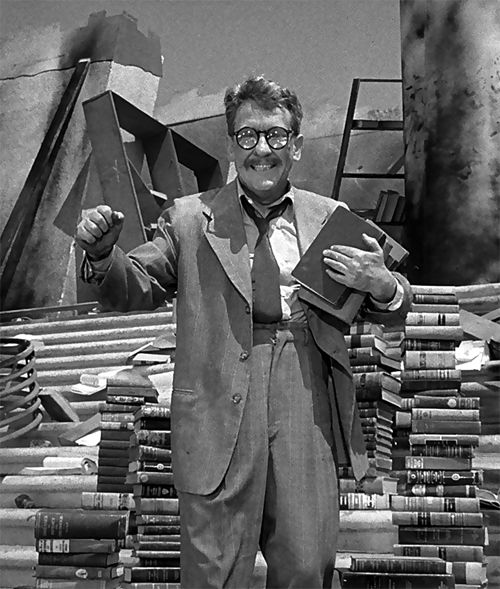Considering the best-case scenario of how many days I might possibly have left in my life and how many books I want to read—not even counting the ones yet to be published that will lengthen that list—there’s no doubt I’ll fall well short of crossing off every title. That could be viewed as a blessing: At least I’ll never run out of reading material. It’s also a curse. What if there was another way?
In Cathy O’Neil’s concerned Bloomberg View opinion piece “What If We Could Upload Books to Our Brains?” the editorialist pivots off of a podcast discussion between Neil deGrasse Tyson and Ray Kurzweil, two guys who just won’t give it a rest. The excerpt:
Ray Kurzweil:
Computers are getting smaller and smaller. We’ll have nano-robots the size of blood cells that have computers in them. They’ll go into the brain through the capillaries and communicate with our neurons. We already know how to do that. People with Parkinson’s disease already have computer connections into their brain. My view is that we’re going to become a hybrid, partly biological, partly non-biological. However, the non-biological part is subject to what I call the Law of Accelerating Returns. It’s going to expand exponentially. The cloud is expanding exponentially. It’s getting about twice as powerful every year. Our biological thinking is relatively fixed. I mean, there’ve been a few genetic changes in the last few thousand years, but for the most part it hasn’t changed much, and it’s not going to expand because we have this fixed skull that constrains it and it actually runs on a very slow substrate that’s a million times slower than electronic circuits.
Neil deGrasse Tyson:
Then why invoke the brain-machine connection at that point? You’ve got the machine.
Ray Kurzweil:
Because it’s a much faster interface. Our fingers are very slow.
Neil deGrasse Tyson:
The world is going too slow for you. You want to speed it up.
Ray Kurzweil:
I mean, it is. How long does it take you to read The Brothers Karamozov? It takes months.
Neil deGrasse Tyson:
So you’re suggesting that you can get these nanobots the size of your neurosynapses and one that will be pre-loaded with War and Peace and will somehow inject it into your neurosynaptic memory banks and then you’re done, you’ve got it. Just like in the Matrix, they would load memory programs into you.
Ray Kurzweil:
We will connect into neocortical hierarchies in the cloud. Some of that could have preloaded knowledge.•
A couple things: 1) Even if your lips move, it should not take months to read the Brothers Karamozov. 2) Feel free to toss Kurzweil’s “Law of Accelerating Returns” onto a pile of e-waste, as he’s often wildly optimistic in these matters.
That means we likely won’t be the ones making decisions about this brave new world, if humans get to make them at all. I assume Kurzweil means the result of volumes being uploaded into our descendants’ wetware would be different than if they were fed into a computer, that these future people wouldn’t just absorb this information as data but would be capable of analysis and criticism as if they’d actually sat and read them.
It would be akin to swallowing a pill dinner instead of eating food. Of course, that way of taking nourishment would cause jaws, mouths, teeth, throats and stomachs to change, likely for the worst. You’d have to think parts of our brains might go slack if we were plugging them into a library, painlessly absorbing shelves at a time.
When futurists talk about carbon-silicon hybrids as necessary to evolve and save the species, they’re actually talking about perpetuating some form of life, more than specifically “human life.”
From O’Neil:
What if humans could upload all the great classics of literature to their brains, without having to go through the arduous process of reading? Wonderful and leveling as that may seem, it’s a prospect that I’m not sure we should readily embrace.
A while ago, I listened to an interview with futurist Ray Kurzweil on astrophysicist Neil deGrasse Tyson’s radio show StarTalk. Kurzweil described (starting at 10:30) how our brains might someday interface directly with non-biological forms of intelligence, possibly with the help of nano-bots that travel through our capillaries.
Given how much faster this interface would be than regular reading, he went on, we’d be able to consume novels like “The Brothers Karamazov” in moments, rather than the current rather clumsy form of ingestion known as reading, which, he said, “could take months.”
At this point Tyson interjected: Are you saying we could just upload War and Peace? Yes, Kurzweil answered: “We will connect to neocortical hierarchies in cloud with pre-loaded knowledge.”This snippet of conversation has baffled and fascinated me ever since.•
Tags: Cathy O’Neil

